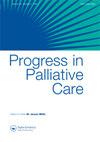Facilitators of and barriers to continuity with GPs in primary palliative cancer care: A mixed-methods systematic review
IF 0.9
Q4 PUBLIC, ENVIRONMENTAL & OCCUPATIONAL HEALTH
引用次数: 0
Abstract
Background: General practitioners (GPs) have a key role in palliative care provision for patients with advanced cancer. Continuity is valued by patients with such needs but is limited within current primary care systems. Exploration of the facilitators of and barriers to continuity in this complex context is required. Aim: To identify facilitators of and barriers to continuity with GPs in primary palliative care among people with advanced cancer and/or their close persons. Design: Mixed-methods systematic review with content and thematic analyses. Data sources: Keyword searches were carried out in five databases (Ovid MEDLINE(R), Ovid EMBASE(R), CINAHL, Web of Science, and Cochrane), policy documents and grey literature search engines in December 2020. Evidence was reviewed using relevant quality appraisal tools; data were extracted and tabulated. Findings were reported in accordance with the Preferred Reporting Items for Systematic Reviews and Meta-Analyses statement, and the review was prospectively registered on PROSPERO. Results: Seventeen studies were included. Six studies originated from the UK; six from Europe; three from Canada; and two from Australia. Two studies were mixed-methods, four presented quantitative data, and 11 papers reported on qualitative studies. Four themes were developed: (1) the role of GPs in facilitating continuity; (2) the role of patients and/or close persons in facilitating continuity; (3) changing needs throughout the disease trajectory; and (4) the organisational context in primary care. Conclusions: Facilitators of and barriers to continuity in primary palliative care are outlined. Further research is required to explore how patients and/or their close persons experience continuity in primary palliative care. Specifically, the work required of them to achieve their desired level of continuity, and their capacity for action in this context, needs further attention.癌症初级姑息治疗中全科医生连续性的推动者和障碍:混合方法系统综述
背景:全科医生在为晚期癌症患者提供姑息治疗方面发挥着关键作用。有这种需求的患者重视连续性,但在目前的初级保健系统中是有限的。需要在这一复杂的背景下探讨连续性的促进者和障碍。目的:在晚期癌症患者和/或其近亲中,确定全科医生在初级姑息治疗中的促进因素和障碍。设计:混合方法系统回顾与内容和主题分析。数据来源:2020年12月,在五个数据库(Ovid MEDLINE(R)、Ovid EMBASE(R),CINAHL、Web of Science和Cochrane)、政策文件和灰色文献搜索引擎中进行了关键词搜索。使用相关质量评估工具审查了证据;提取数据并制成表格。根据系统评价和荟萃分析的首选报告项目声明报告研究结果,并在PROSPERO上进行前瞻性登记。结果:纳入17项研究。六项研究来自英国;六个来自欧洲;三个来自加拿大;两个来自澳大利亚。两项研究是混合方法,四项提供了定量数据,11篇论文报道了定性研究。制定了四个主题:(1)全科医生在促进连续性方面的作用;(2) 患者和/或亲近者在促进连续性方面的作用;(3) 在整个疾病轨迹中不断变化的需求;以及(4)初级保健的组织背景。结论:概述了初级姑息治疗连续性的促进因素和障碍。还需要进一步的研究来探索患者和/或其亲近者如何在初级姑息治疗中体验连续性。具体而言,需要进一步关注它们为实现预期的连续性水平所需的工作,以及它们在这方面的行动能力。
本文章由计算机程序翻译,如有差异,请以英文原文为准。
求助全文
约1分钟内获得全文
求助全文
来源期刊

PROGRESS IN PALLIATIVE CARE
PUBLIC, ENVIRONMENTAL & OCCUPATIONAL HEALTH-
CiteScore
2.60
自引率
11.80%
发文量
24
期刊介绍:
Progress in Palliative Care is a peer reviewed, multidisciplinary journal with an international perspective. It provides a central point of reference for all members of the palliative care community: medical consultants, nurses, hospital support teams, home care teams, hospice directors and administrators, pain centre staff, social workers, chaplains, counsellors, information staff, paramedical staff and self-help groups. The emphasis of the journal is on the rapid exchange of information amongst those working in palliative care. Progress in Palliative Care embraces all aspects of the management of the problems of end-stage disease.
 求助内容:
求助内容: 应助结果提醒方式:
应助结果提醒方式:


